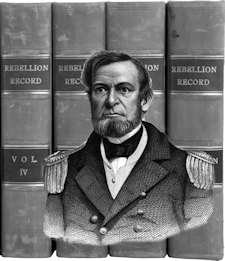January 11.—The Confederate troops burned two bridges on the Louisville and Nashville railroad, at points between Munfordville and Bowling Green.—Cincinnati Commercial.
—This morning three rebel boats from Columbus, Ky., attacked the gunboats Essex and St. Louis, lying off Fort Jefferson. A brisk engagement ensued for a short time, when the rebels retreated, and the national boats pursued until they reached the batteries of the enemy at Columbus.—(Doc. 13.)
—The First Maryland regiment, Colonel Kenly, are strongly entrenched at Old Fort Frederick, above Hancock, where they are frequently reconnoitered at a distance by small bodies of the enemy. The Colonel has sufficient ordnance to maintain himself there, as well as to command the railroad opposite.—Baltimore American, Jan. 14.
—The Florida Legislature has elected A. E. Maxwell and I. M. Baker to the Confederate Senate. — Sixty rebels, belonging to the regiment of Colonel Alexander, a prisoner in St. Louis, were captured about six miles from Sedalia, Mo.
Picket-shooting existing to a fearful extent in the vicinity of Cairo, Ill., General Grant this day issued the following order to General Paine, commanding the United States forces at Bird’s Point: “I understand that four of our pickets were shot this morning. If this is so, and appearances indicate that the assassins were citizens not regularly organized in the rebel army, the whole country should be cleared out for six miles around, and word given that all citizens making their appearance within these limits are liable to be shot.
“To execute this, patrols should be sent out in all directions, and bring into camp at Bird’s Point all citizens, together with their subsistence, and require them to remain, under penalty of death and destruction of their property, until properly relieved.
“Let no harm befall these people if they quietly submit, but bring them in and place them in camp below the breastwork, and have them properly guarded.
“The intention is not to make political prisoners of these people, but to cut off a dangerous class of spies.
“This applies to all classes and conditions, age and sex. If, however, women and children prefer other protection than we can afford them, they may be allowed to retire beyond the limits indicated—not to return until authorized.”
—The Twenty-eighth regiment of Massachusetts Volunteers, under command of Colonel William Monteith, left Boston for New-York, en route for the seat of war.—N. Y. Commercial, Jan. 13.
—Colonel Garfield, having defeated the rebels under Humphrey Marshall, occupied Prestonburg, Ky., to-day.








